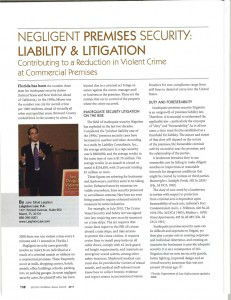Negligent Security Seminar | March 2015
Florida personal injury lawyers
talk to an attorney 888.988.1774
NO FEES or COSTS UNLESS YOU GET PAID
Leighton publishes “Negligent Premises Security – Contributing to a Reduction in Violent Crime”
John Elliott Leighton’s publication in the South Florida Legal Guide explains how negligent premises security litigation has contributed top a reduction in violent crime at commercial premises. One of the most fundamental purposes of the tort system — increased safety — is accomplished through the use of the civil justice system. Mr. Leighton, author of numerous articles and a two volume text book Litigating Premises Security Cases, describes how many of the goals of tort law are accomplished through social and economic change. Mr. Leighton has been litigating and trying violent premises liability cases for over 25 years. Several of his cases have resulted in changes in security, policies and procedures.
Negligent Premises Security: Liability & Litigation
Contributing to a Reduction in Violent Crime at Commercial Premises
By John Elliott Leighton
Board Certified Trial Lawyer
FLORIDA has been the number three state for inadequate security claims (behind Texas and New York but ahead of California). In the 1990€™s Miami was the number one city for overall crime per 1000 residents, ahead of virtually all other metropolitan areas. Broward County ranked third in the country in crime. In 2008 there was one violent crime every 4 minutes and 11 seconds in Florida.1 Negligent security cases generally involve an injury to an individual as a result of a criminal assault or robbery on a commercial premises. These frequently occur at malls, shopping centers, hotels, motels, office buildings, schools, parking lots, or parking garages. In most negligent security cases, the plaintiff who has been injured due to a criminal act brings an action against the owner, manager and/or business at the premises. These are the entities who are in control of the property where the crime occurred.
Inadequate Security Litigation on the Rise
The field of inadequate security litigation has exploded in the last two decades. Considered the €˜product liability case of the 1990€™s,€™ premises security cases have increased in number and value. According to a study by Liability Consultants, Inc., the average settlement in a rape security case is $600,000, and the average verdict in the same type of case is $1.75 million. The average verdict in an assault in a hotel or motel is $254,850, with 25% totaling $1 million or more. These figures are sobering for businesses and landowners, and they seem to be taking notice. Enhanced security measures are visible everywhere, from security personnel to surveillance cameras. New laws are even being passed to require enhanced security measures by entire industries. For example, in July 2010, The Cruise Vessel Security and Safety Act was signed into law, requiring new security measures on cruise ships. The Act requires that cruise lines report to the FBI all crimes aboard cruise ships, and take actions to protect the crime victims. It requires cruise lines to install peep holes on all cabin doors, comply with 42-inch guard rail height requirements, and maintain an emergency sound system, among other safety measures. Shipboard medical care must also be provided for victims of sexual assault, and medical staff onboard must know how to collect forensic evidence and report crimes in international waters. Penalties for non-compliance range from stiff fines to denied entry into the United States.
Duty and Foreseeability
Inadequate premises security litigation is an outgrowth of premises liability law. Therefore, it is essential to understand the applicable law €“ particularly the concepts of €˜duty€™ and €˜foreseeability.€™ As in all tort cases, a duty must first be established as a threshold for liability. The nature and extent of that duty will depend on the nature of the premises, the foreseeable criminal activity on and/or near the premises, and the relationship of the parties.
- A landowner breaches duty to use reasonable care by failing to make diligent searches or inspections at reasonable intervals for dangerous conditions that might be created by invitees or third parties. Boatwright v. Sunlight Foods, 592 So.2d261 (Fla. 3d DCA 1992)
- The duty of care owed by a landowner to invitee with respect to protection from criminal acts is dependent upon foreseeability of such acts. Admiral’s Port Condominium Ass’n. v. Feldman, 426 So.2d 1054 (Fla. 3d DCA 1983); Medina v. 187th Street Apartments, 405 So.2d 485 (Fla. 3d DCA 1981)
Inadequate premises security cases can be difficult and expensive to litigate, yet they play a major role in creating corporate and individual deterrence, and creating an incentive for businesses to provide adequate security. It is as a consequence of this litigation that we now see security guards, better lighting, improved design and an overall security awareness that was not present twenty years ago. 1Florida Department of Law Enforcement statistics, 2008.
BY JOHN ELLIOTT LEIGHTON, ESQ. LEIGHTON Panoff LAW, P.A. 1401 Brickell Avenue, Suite 900 Miami, FL 33131 -and- 121 South Orange Avenue, Suite 1150 Orlando, FL 32801 888-395-0001


Parasailing safety regulations.
John Leighton appears on CNN to comment on proposed parasailing safety regulations.

Today Show with John
John Leighton appears on NBC’s “Today” show as part of his representation of the family of Amber May White, who was killed in a parasailing tragedy.

Cover story: Leighton Crusader for Safety
John Leighton featured on the cover of South Florida Legal Guide






















